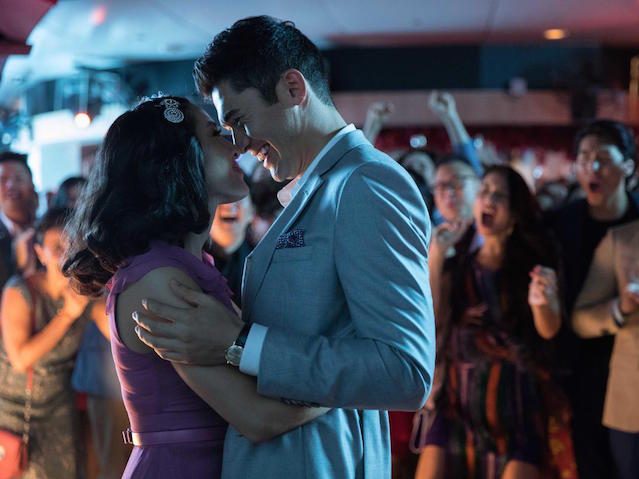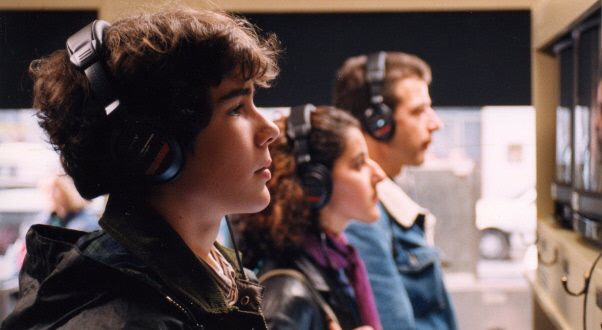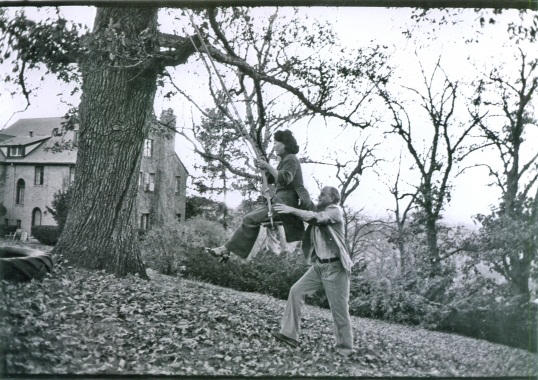For a film that positions itself as a watershed in the Asian American rom-com canon, when tasked with illuminating romance’s political valences, Crazy Rich Asians pulls up short.

September 20, 2018
The opening scene of Crazy Rich Asians cuts to the chase. Turned away from a posh London hotel by a white manager who reroutes her to Chinatown, Singaporean socialite Eleanor Young makes a call to family and, within seconds, acquires the establishment. Eleanor returns to command the stunned manager—the film’s last white speaking role—to mop the floor, practically winking at the Twitter hordes waiting in the wings. It’s tempting to read the scene as a nod toward Asian empowerment, but Eleanor’s highbrow clapback sets into motion the film’s vision of a world where Asian empowerment, romantic love, and kinship boil down to money, and having lots of it. The title doesn’t hedge: Crazy Rich Asians is, above all, a story about being crazy rich.
Much has been made of the fact that it’s been a quarter-decade since The Joy Luck Club, the last high-budget film featuring a majority-East Asian cast, hit Hollywood screens. But there has been little talk of Crazy Rich Asians as a romantic comedy, with its own generic conventions, chief among them a preoccupation with romance as salve and solution to its characters’ ills. This year yielded a Big Summer for Asian American Romance, delivering Crazy Rich Asians and also Netflix’s wholesome smash, To All the Boys I’ve Loved Before, featuring three half-Korean sisters in the seas of white suburbia. It’s worth looking further back, though, deeper in the incipient canon of Asian American film. Few in all the hype over Crazy Rich Asians have linked director Jon M. Chu’s latest to closer siblings in the genre like 2016’s The Big Sick, a drama centered on antagonisms that arise between comedian Kumail Nanjiani and his Pakistani parents when he begins dating a white woman; or Ang Lee’s The Wedding Banquet, released over a month before The Joy Luck Club, which follows a gay Taiwanese-American man’s fraudulent marriage, assembled to satisfy his parents’ demands for a wife.
The conventional rom-com permits the fantasy of romance to unfurl, sans real-life limits. Think Sleepless in Seattle, in which Meg Ryan manages to fall in love with a disembodied Tom Hanks talking about his dead wife on the radio, and ensuing challenges are surmounted with the help of an eight-year-old; or While You Were Sleeping, starring Sandra Bullock as a sad Chicago ticket collector who masquerades as the fiancée of a handsome commuter after he falls into a coma—only to fall for his brother. Comedy arises from the ridiculous ways love doesn’t (and maybe shouldn’t) work, and the lengths protagonists will go to secure it. These conflicts, however, are merely ancillary to the irrepressible march toward union: Love as savior eventually swoops in, bearing the plenary power to transform and correct.
When it comes to watching rom-coms, the guarantee of romance realized against all odds is, in itself, the seductive thing. A sense of formulaic safety is central to the genre’s marketable appeal, but also limits what the genre can do or say. John Hartley argues that genre texts operate as “agents of ideological closure”: The repetition of tropes, like the infallible happy ending, closes off new avenues of meaning, which is to say that rom-coms tend to crystallize a singular world-vision wherein romantic love always wins. So what happens when the rom-com collides with the immigrant narrative, in which clean resolution without significant sacrifice is very rarely guaranteed? How is love rendered for those for whom a “successful” narrative means the realization of upwardly mobile and ultimately assimilationist aspirations? It’s in the overlap between the conventional rom-com and the conventional immigrant success story that the Asian-diasporic rom-com writes itself. The genre’s hybridity creates new room to recognize that interpersonal relationships are not simply ends in themselves, but sites of racial and ethnic formation, where notions of identity are contested most forcefully.
In the Asian diasporic rom-com, romance frequently shoulders up against the immigrant narrative in its most recognizable venue: the nuclear family. Based on the circumstances of screenwriter Kumail Nanjiani’s own interracial marriage, The Big Sick follows a loosely fictionalized middling comedian in Chicago (named after himself) who sparks with a white woman named Emily during one of his sets. Their relationship, kick-started by their post-show one-night-stand, is upended when Kumail refuses to introduce Emily to his Muslim family, who continue to insist that Kumail has an arranged marriage with a Pakistani woman. In The Wedding Banquet, protagonist Wai-Tung Gao, a gay Taiwanese American, is under relentless pressure to produce a grandchild. To hide his relationship with his white boyfriend, Simon, Wai-Tung enters into a beard-cum-greencard-marriage to a woman from mainland China, Wei-Wei. The crossfire between parents and children is a timeless trope of the genre, as the endless installments of Meet the Fockers would testify, but in the racialized rom-com, the texture of the conflict cuts a little differently. As Kumail rails at Emily when she grows upset at his well-intentioned duplicity: “I’m fighting a 1400-year-old culture. You were ugly in high school! There’s a big fucking difference.”
The initially career- and marriage-driven tensions between Kumail and his parents come to a standoff after he rejects a particularly promising marriage proposal. His parents whelm him with the titanic weight of immigrant sacrifice: decades of lost connections with family in Pakistan and the enduring toil as undervalued workers with discounted qualifications. The message is clear. Kumail’s lackluster comedy career has failed to meet his parents’ standards of economic success—the least he can do is marry a Pakistani woman. Kumail proceeds to disclose his relationship with Emily and confesses that he hasn’t prayed in years. The consequence is immediate banishment. When characters trade their potential to achieve “good immigrant” status for romance, the eventual disgrace—funny at first—threatens to become absolute. As Kumail fights for love and self-actualization while permanently losing his family in the process, the dawning realization that seemingly unbreakable bonds to kin are in fact breakable is the most devastating discovery of all.
Violence as enacted by the family, conventionally conceived as the first site where love-as-unconditional is learned, is literalized in The Wedding Banquet. From the start of their engagement, Wai-Tung and Wei-Wei stumble through inelegant hurdles of a fabricated domestic life, with Simon finding himself increasingly relegated to the sidelines as wedding preparations pile up. The rom-com takes a sharply dark turn when, in a drunken encounter on their wedding night, Wai-Tung is raped by his ersatz wife—a detail that, along with the fraudulent nature of their marriage, disappears from the plot when Wei-Wei becomes pregnant. Despite the assault, Wai-Tung is pleased to bear a son for parents who will not explicitly acknowledge his sexuality. Later, it’s revealed that his father knew of Wai-Tung and Simon’s coupling early on, but he strategically holds his silence to play along with the sham. As Mr. Gao puts it, if he had revealed his suspicions about their relationship prior to the pregnancy, how would Wai-Tung’s parents have gotten the heir they wanted?
It’s a ruthless ploy by Mr. Gao—a tacit manipulation of a relationship triangle in order to enforce continuation of his biological lineage. Rey Chow writes, “From the perspective of the Chinese patriarchy, as long as the goal of perpetuating the family line is not forgotten, there is no practical reason to perceive the ‘perversion’ and ‘aberration’ (that is, the purposeless pleasures) of homosexuality as a threat.” Marriage in The Wedding Banquet is not a simply sentimental union, but an ad-hoc arrangement laden with historically specific demands. Mr. Gao permits Wai-Tung’s queerness in the name of fulfilling his duty as the guarantor of his lineage; the notion of non-reproductive sexuality never has to be grappled with. The product of patriarchy and pressures of the Chinese nation-state, Wai-Tung and Wei-Wei’s mutually joyless marriage is the opposite of an organic consummation of romance. When Wai-Tung, Wei-Wei, and Simon gather at the film’s close, dazedly watching the Gaos depart into airport security, the precariously arranged family-of-three bears lesions of the ways relationships can and do strain in order to function. If the cultural export of the rom-com is that unconditional love is the answer to our ills, even if or especially when that love is disobedient, The Big Sick and The Wedding Banquet capsize this tenet by asking whether this is the case; and if so, at what cost?
These are questions Crazy Rich Asians eyes from a distance, and from a distance only. Based on the debut novel by Kevin Kwan, the film follows Rachel Chu, Chinese American professor of economics at NYU and daughter of a working-class, single, and immigrant mother, as she jets off to Singapore to meet the family of her boyfriend Nick Young. Incredibly, in their year of dating, Nick has neglected to mention any details about his uber-rich family, an elision that should be a bigger red flag than it’s made out to be, considering he doesn’t have the decency to buy her a slice of dessert. Only after the lovers board first class does he reveal that he’s heir to one of the largest fortunes in the world. While being swept into all the indices of glittering wealth—the gowns! the hotels! the cars!—Rachel meets Nick’s mother, who makes immediately clear her disapproval of Rachel’s background, urging her son to move back to Singapore.
It hasn’t been all fanfare since it was announced that Kwan’s novel would hit silver screens. Audiences and critics alike have pointed out the lack of representation of working-class Singapore and of Southeast and South Asians, who constitute nearly a quarter of the city-state’s population but are relegated to playing guards and servants to the film’s primarily East Asian cast. Some, like Jiayang Fan, have noted that the burden of representation is not placed on films featuring white leads, which are “asked only to tell a single story convincingly.” But Crazy Rich Asians has leaned into its de facto role as a conduit for widespread conversations about Asian and Asian-diasporic identity. As director Jon M. Chu told The Hollywood Reporter, “The moment you bring up an Asian-led movie, there’s one example to point to, and that’ll be us… to be on the biggest stage with the biggest stakes, that’s what we asked for.”
For a film that positions itself as a watershed in the Asian American rom-com canon, when tasked with illuminating romance’s political valences, Crazy Rich Asians pulls up short. While the film inherits the lineage of its cinematic predecessors, what it attempts to pass as familial concerns, motivated along racial or ethnic lines, are thoroughly undercooked. Nick jokes after introducing Rachel to his mother, that she should be pleased at his bringing home a “Chinese professor,” a description Eleanor is quick to correct: “Chinese American.” This is among the first of Eleanor’s many jabs at branding Rachel as a cultural and racial outsider. As her former college roommate, Peik Lin, puts it to Rachel, “[Eleanor] thinks you’re some kind of unrefined banana: yellow on the outside, white on the inside.” Gratuitous lines that attempt racial stratification are strewn throughout the plot without explanation, reading as labored efforts to prove that Crazy Rich Asians is indeed the groundbreaking film about race that audiences were promised.
It’s ironic that Crazy Rich Asians fails to unpack the notion of authentic Asian-ness that it takes as a given. One scene has Rachel making jiaozi with the Young clan, which starts off sweetly before Nick’s aunties put forth the key distinction between real Asians and those from the West: In Asia, people care about passing down traditions, while in America, they eat mac-and-cheese and stuff their parents into old folks’ homes. The film reifies a false East-West binary and, at worst, papers over the grubbier nature of class-based intolerance that’s at play. At one point, Eleanor suggests Rachel’s “American” upbringing means that the professor will prioritize her ambitions over what’s best for the family, as if the white-and-American crazy rich don’t also invest in multiplying their family fortunes. To take her description of racialized difference at face value is to ignore the fact that Eleanor’s notion of what’s best for family has little to do with Rachel’s being Chinese American, and a lot to do with money.
The borderless and transcendent world of what Mark Chiang calls “moneyed cosmopolitan classes under globalization” is where the Youngs splash about for the film’s two-hour runtime. Capital comes to mean everything: what racial and women’s empowerment entail (spending money), what makes Asia great and cool (Asians can have a lot of money), and most importantly, what family is for (getting money). Eleanor wants Nick to return to Singapore so he can assume his position as the heir of his family’s business and fortune, and for all Rachel’s broken Mandarin—spoiler alert—it’s ultimately the revelation that Rachel was born out of wedlock that renders her an unacceptable candidate for marriage to Nick’s amma, the family matriarch who has final say on Nick’s love life. But the influence of wealth on family dynamics is rarely spoken of among the film’s characters, even after Rachel happens upon the disturbing revelation that Nick’s family wanted him to couple up with the Young family corporation’s acceptably plutocratic lawyer. Recurring montages of emphatic hugs, authentic-looking satays, and Cantonese one-liners further mask a greater context in which family is namely the closest organizational pattern by which one can receive and redistribute wealth.
The Big Sick and The Wedding Banquet treat seriously the demands of kinship as they pertain to work, religion, and sexuality. While the circumstances of extreme wealth presents an opportunity for Crazy Rich Asians to reflect anew on how such demands are produced, it’s disappointing that the film fails to take up this challenge, exhibiting a certain naiveté about its own political potential. After dramatically rejecting Nick’s proposal, Rachel delivers the climactic uppercut to Eleanor over a remarkably unsubtle game of mahjong: Rachel won’t be the one to tear the Young family apart, leaving Eleanor’s intended arrangement of heirs and suitable spouses untouched. “If Nick chose me, he might lose his family,” Rachel posits. “And if he chose his family, he might spend the rest of his life resenting you.” It’s cathartic to see the outsider invert the exclusive logics which have been used against her into a weapon, but Rachel’s argument is specious as there are no real stakes in the disgrace structuring the narrative. Nick himself seems generally ambivalent about his mother’s disapproval, and he has already spurned previous attempts to make him return. “Ever since I can remember, my family has been my whole life… Marry me, and I’ll leave this all behind,” Nick proposes to Rachel, moon-eyed. What does disgrace really mean when it’s so easy to walk away?
This isn’t to say that Asians or Asian Americans can’t have fantastical films or happy endings—of course they can, and do. However, Crazy Rich Asians trades off its chance to meaningfully comment on diasporic frictions uniquely produced by wealth, settling for the alluring, hyperbolic absurdity of the crazy rich. The important work done by previous Asian-diasporic rom-coms that make the film’s existence in 2018 possible goes largely neglected. The Big Sick and The Wedding Banquet—along with films like Saving Face, My Beautiful Laundrette—have made funny and legible the pull of tradition and the bonds of family across oceans and generations. At their core, they’ve made the radical claim that romantic love sometimes does not come first or without cost; that the synthesis of past and present, the venturing into the unknown so characteristic of the diasporic experience is rarely clean and often fractured. Crazy Rich Asians doesn’t so much engage with this discourse as it borrows the trappings of familial and cultural tensions before settling into a collage of Cinderella moments, vacated of possible new meanings. By the end, all sense of confrontation has given way noiselessly, instantaneously and somewhat senselessly, pulling away into the blithe shallows of crazy, rich love.



